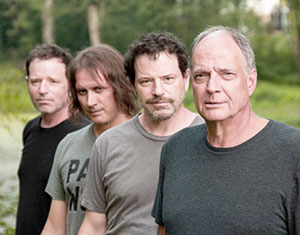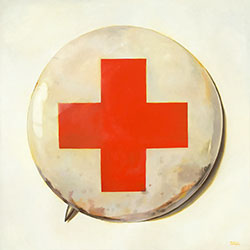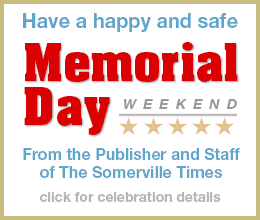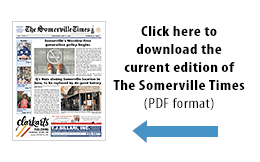
Tobin Sprout makes a stop at Arts at the Army next Sunday. L to R: Steve Vermillion, Tommy Schichtel, Gary Vermillion, Tobin Sprout. — Photo by Wayne Pickard
By Blake Maddux
As a member of the scrappy indie rock band Guided by Voices from 1986-1997, Tobin Sprout played on and wrote songs for beloved lo-fi classics such as Bee Thousand, Alien Lanes, and Under the Bushes Under the Stars. Between 2012 and 2014, he did the same for six releases that appeared after the band’s “classic lineup” reunited in 2010.
As a solo musician, he has recorded only a half-dozen albums under his own name in the past quarter century, only three of which have come out since 2010. Still, these numbers do not tell the whole story, as he also recorded in a duo called Airport 5 with Guided by Voices lead singer/ songwriter Robert Pollard and as the leader of a trio called Eyesinweasel in the early 2000s.
Despite all of this musical output, Sprout’s most enduring passion is visual art.
Since discovering his drawing talent in his youth and honing his skills as a graphic design student at Ohio University, Sprout has developed an impressive portfolio as a painter whose work has been commissioned by corporate clients and celebrity admirers. Further evidence of his talents can be found in the two children’s books that he has written and illustrated: Elliott (2009) and Tinky Puts His Little Moon to Bed (2013).

The cover of Sprout’s latest album, “Empty Horses,” painted by Sprout himself.
September 2020 saw the release of Empty Horses, a collection of songs that sound on the whole like nothing else in Sprout’s discography. The 10 tracks paint with their words and music a desolate 19th-century American landscape, one decimated by the Civil War and inhabited by confused individuals who desperately try to cope with literal and figurative destruction.
One need listen no further than Sprout’s 2017 LP The Universe and Me or even just the more characteristic 2021 single Supersonic Chairman to appreciate what a stylistic departure the new album is for its creator.
I spoke to Sprout by phone about Empty Horses in advance of his November 14 show at Arts at the Armory.
The Somerville Times: How would you contrast Empty Horses with your last album, 2017’s The Universe and Me?
Tobin Sprout: I think The Universe and Me is more along the pop styling. More along the rest of the albums that I’ve put out. This one, I think, is just a little bit darker, but it’s got some hope in there, too. It kind of reminds me of [my 1997 album] Moonflower Plastic, where I was doing songs that normally you wouldn’t have on a GBV [Guided by Voices] album. Piano-based stuff that I’d kind of written and then didn’t use until I started doing solo albums.
TST: Many of the tracks on Empty Horses share themes of war and religion. Were all of the songs written as a batch during a specific period of time?
TS: It’s an album I had kind of been trying to put together for a while. I put out Antietam right before the GBV reunion, and never really got anything going with that. I wasn’t going to put it on there until towards the end, then it just seemed to be the perfect fit for the rest of the album.
TST: What prompted you to write a song about that notoriously bloody battle?
TS: I didn’t really decide to do an Americana album, but that’s kind of how it turned out. I’ve always been interested in American history. A lot of my songs, like To Remake the Young Flyer [from the 1996 Guided by Voices album Under the Bushes Under the Stars], kind of touch on historical points, but don’t really delve into them. This kind of more delves into the Civil War and ties the album together with that theme. It doesn’t go all the way through, but it’s there. It begins and ends, and there’s sort of an intertwining of the carnage that went on.
TST: Of all the episodes in American history to write songs about, why the Civil War specifically?
TS: My grandfather was a big Civil War … I don’t want to say “buff,” but that’s what you call them. We had a relative in the Union army who was a mail clerk. So, we kind of had a family history, and I think that’s where he got his interest. He actually had my great-great-grandfather’s pistol, which was eventually stolen out of his house. He used to shoot off blanks on the 4th of July.
TST: What would you say accounts for the lyrical and musical unity of Empty Horses?
TS: It just sort of all came together. When we started, it was sort of two albums. We had some of the more pop songs on there, like Supersonic Chairman, which would have been on the album. But we just got to the point where, and the band mentioned it first, we had two albums and maybe we should split them up. When Fire [Records] signed for this album, they said the same thing. So, we kind of went through and picked out what wasn’t working and what was and kind of put it together that way. I wrote No Shame to kind of finish the album off. That was one of the last songs that I put on there.
TST: Did anything that you had been listening to recently inspire the musical direction?
TS: Not that I can think of directly. But I’ve always liked that sort of, I don’t know, southwestern style. It’s not really country. Like Son Volt, who have sort of a twang to them, I guess.
TST: I couldn’t help but be reminded of The Night They Drove Old Dixie Down as I listened to the album.
TS: Oh yeah, definitely. I’m a big Band fan, so that’s definitely in there.
TST: Somewhat to my surprise, your singing on some of these songs occasionally reminded me of Tom Waits and Leonard Cohen.
TS: Oh yeah? My wife’s always said, “You know, you can sing lower. Why don’t you sing lower some time?” So, I just started experimenting with that. It’s sort of exciting to experiment with different voices. You can kind of take on different characters. So that’s kind of where that came from. Then it just became comfortable to sing in a lower register, ‘cause I’m so used to singing harmonies, so I stay up in that high register. It was kind of fun to do.
TST: Speaking of that, were you expressing your own feelings or those of your subjects with your mentions of God, Jesus, and the Bible?
TS: A little of both. I think a lot of it is through the characters. It was prominent during the Civil War, people praying out on the battlefield. Why would [God] make something like this happen, and would they still believe after going through all this that there is a god? It takes a lot to keep your faith after going through something like that.
TST: What inspired the long instrumental passage the end of All in My Sleep, a song that is uncharacteristically long at 6:20?
TS: That was a piece that I wrote a long time ago. I’d tie it into different songs and it just never worked until now. Drew Howard, the pedal steel player, and I just experimented with it. I had him come into play on Breaking Down, and while he was there, we asked him to try doing the end of this piece that we wrote. And it was sort of this haunting thing that flows through the whole end of it.
TST: Will there be another release consisting of the remainder of the two albums’ worth of material?
TS: Both sides of the single [Supersonic Chairman and We Should Be Wishing] were going to be on the album. I’m thinking about putting out another single with a couple of the other ones. And then move on to newer ground.
TST: Do you think that the songs that are not released as singles/B-sides will find a home on your next album?
TS: They’ll all find a home eventually!
Tobin Sprout with Hallelujah the Hills. Sunday, November 14, at Arts at the Army (191 Highland Ave). Doors at 6:30.
















Reader Comments